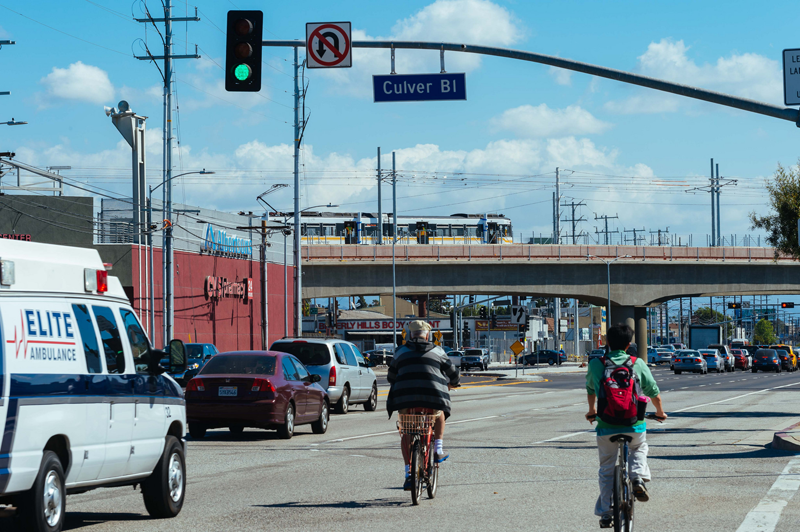A lot more money for highways. A little more money for bikes and bridge repair.
That's the upshot of a big new federal transportation spending bill moving forward in Congress. The $287-billion five-year bill introduced earlier this week would move transportation policy forward, especially with respect to sustainability. But it's still mostly business as usual — usual and, alas, bigger — with respect to highways.
Here are the highlights:
Increased highway spending
The bill would obligate about $57 billion a year for highways — about a 40 percent increase over current spending levels. This is big money with few to no strings attached.
Of that total, 90 percent would be sent to the states by formula — meaning, they can do whatever they want with it, including blowing it all on big new highway projects that promote sprawl and entrench solo car commuting while continuing to neglect repair.
By not imposing any requirements for state of good repair, the Senate missed a big opportunity to not only ensure taxpayers' money is well spent, but also to promote environmental responsibility, Transportation for America's Director, Beth Osborne, said in a statement.
"A federal program still focused primarily on delivering high-speed roads guarantees more driving and will undercut the committee's worthwhile efforts to reduce emissions or stem the tide of climate change," she said.
Transportation for America was also disappointed there are no Complete Streets requirements for states, even as we've seen a huge increase in pedestrian fatalities. Another bill moving through Congress mentions that — though it's tiny.
More funding for walking and biking
On the bright side, the bill contains more money for walking and biking.
The "Transportation Alternatives" program that funds walking and biking projects is increased from $850 million annually to $1.2 billion annually, or about 41 percent. Still, the funding is small compared to the need.
For scale, Texas is planning to spend $7 billion on a single highway megaproject in Houston.
The bill does contain some good policy reforms as well to try to nudge states in a more sustainable direction — which is badly needed. It also contains a new $250 million safety program that requires states and metro areas with higher-than-average bike and pedestrian fatality rates to spend the money to address that.
Overall, the League of American Bicyclists was pretty enthusiastic about it.
"For advocates who were hoping for a complete revision of the transportation program, this bill is not that," the Bike League's Caron Whitaker wrote. "However, the addition of the climate title, the safety incentive programs and other new additions are a significant step forward to encouraging states and municipalities to plan and build differently."
Make infrastructure more 'resilient'
The main goal of ranking Senate Infrastructure and Public Works Committee Member Tom Carper (D-Del.) was to get some funding to address climate change in the bill. And in that he did succeed, to some extent.
The bill contains $10 billion for climate and resilience programs. Of that, $5 billion would go toward for resiliency programs that protect roads and bridges from flooding wildfires and other natural disasters.
In addition, states would also get a chance to compete for $3 billion in funding to help lower their carbon emissions. They will also get to compete for $1 billion will provide competitive grants for electric vehicle charging infrastructure.
"While many of the programs in this section are fairly small, the mere existence of this section is a huge step forward and will be good for bikes," Whitaker said.
The bill would also contain $500 million in grant awards to cities that reduce climate emissions. And an additional $200 million for programs to increase transit use and carpooling on highways.
Transportation for America's Osborne said, unfortunately, much of this important and overdue work will be "undercut by substantial funding increases for high-speed roadways."
$6B for bridges
A bit of good news on the repair side: The bill includes a $6 billion program for bridge repairs. That will force states to be more disciplined about spending. Unfortunately, this is a small portion of overall funding.
Highway repair
The bill also contains a program that would help cities repair the damage from highways that have bisected urban neighborhoods.
Transit
We don't know yet what's in store for transit. Those negotiations will happen in the Senate Banking Committee.
What's next?
The bill was passed out of the Senate Committee unanimously on Tuesday. It has bipartisan support and is looking strong to pass, especially because it is similar to existing transportation law.
But lawmakers still need to figure out how to pay for it. Because they have been unwilling to raise the gas tax to keep up with inflation, finding funding for transportation bills is always difficult. In the last few years lawmakers have basically resorted to accounting gimmicks.
There's still a lot of opportunities for the bill to change and improve, or potentially get worse. But the House — being Democrat-controlled — is more friendly biking and walking and urban areas than the Senate, so there's good reason to hope it could get better.






